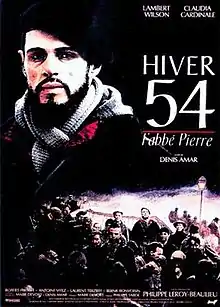Hiver 54, l'abbé Pierre
Hiver 54, l'abbé Pierre is a 1989 French film, directed by Denis Amar, and starring Lambert Wilson and Claudia Cardinale. Supporting actor Robert Hirsch won a Best Supporting Actor award from the French Academy of Cinema for the film.[3]
| Hiver 54, l'abbé Pierre | |
|---|---|
 Theatrical release poster | |
| Directed by | Denis Amar |
| Produced by | Christian Ardan |
| Written by | Marie Devort Denis Amar |
| Starring | Lambert Wilson Claudia Cardinale Robert Hirsch Bernie Bonvoisin |
| Music by | Philippe Sarde |
| Cinematography | Gerard de Battista |
| Edited by | Jacques Witta |
Production company | Belles Rives Productions Midships Associes |
| Distributed by | AMLF Metropolitan Filmexport Circle Releasing Corporation |
Release date | 1 November 1989[1] |
Running time | 102 Minutes |
| Country | France |
| Language | French |
| Budget | $7.3 million |
| Box office | $12.3 million[2] |
Plot
Based on a true story, the film recounts the efforts by a parish priest, Father Pierre, to gain assistance from the government for the homeless, who after World War II were living in poverty and suffering from one of the coldest winters on record. His plea,[4] which was published in newspapers, roused public support and resulted in the establishment of a charity, "Les Chiffoniers d'Emmaus" (The Ragpickers of Emmaus) to raise funds for them. The charity is still operational.[3]
Cast
- Lambert Wilson – Father Pierre
- Claudia Cardinale – Helene Vannier
- Robert Hirsch – Raoul
- Bernie Bonvoisin – Castaing
- Isabelle Petit-Jacques – Mademoiselle Coutaz
- Stephane Butet – Jean
- Wladimir Yordanoff – Senator Charmat
- Philippe Leroy-Beaulieu – Jacques
- Laurent Terzieff – Press Boss
- Bernard Lefort – Paris Prefect of Police
Awards
Robert Hirsch won the César Award for Best Supporting Actor from the Académie des Arts et Techniques du Cinéma in 1990.[3]
References
- "Hiver 54, l'abbe Pierre". Cinema-Francais (in French). Cinema-Francais. Retrieved 9 July 2015.
- http://www.jpbox-office.com/fichfilm.php?id=5513
- Fountain, Clarke (2010). "Hiver 54, l'abbe Pierre (1989)". The New York Times. Retrieved 9 July 2015.
-
Friends, help me…
A woman has just frozen to death in the night, at 3 this morning, on the pavement/sidewalk of the boulevard Sébastopol, clutching to herself some paper thrown out by someone two days earlier…. Each night more than 2,000 people huddle, some almost naked, without a roof and without bread in the freezing conditions. Faced with this horror, it’s no longer enough to say we face an emergency: it’s much more urgent than that! Listen to me: in the past three hours, two first relief centres have been set up: one in a tent at the foot of the Panthéon in the rue de la Montagne-Sainte-Geneviève; the other at Courbevoie. They’re already filling up. This evening we need in every French town and in each quarter of Paris a door with a welcoming illuminated sign showing where people can find shelter, blankets, straw, soup and giving the simple fraternal message, "All who suffer, whoever you are, come in, sleep, eat, rediscover hope: here you are loved. Mes amis, au secours…
Une femme vient de mourir gelée, cette nuit à trois heures, sur le trottoir du boulevard Sébastopol, serrant sur elle le papier par lequel, avant-hier, on l’avait expulsée… Chaque nuit, ils sont plus de 2 000 recroquevillés sous le gel, sans toit, sans pain, plus d’un presque nu. Devant l’horreur, les cités d’urgence, ce n’est même plus assez urgent! Écoutez-moi : en trois heures, deux premiers centres de dépannage viennent de se créer : l’un sous la tente au pied du Panthéon, rue de la Montagne-Sainte-Geneviève ; l’autre à Courbevoie. Ils regorgent déjà, il faut en ouvrir partout. Il faut que ce soir même, dans toutes les villes de France, dans chaque quartier de Paris, des pancartes s’accrochent sous une lumière dans la nuit, à la porte de lieux où il y ait couvertures, paille, soupe, et où l’on lise sous ce titre Centre fraternel de dépannage, ces simples mots : « Toi qui souffres, qui que tu sois, entre, dors, mange, reprends espoir, ici on t'aime ».